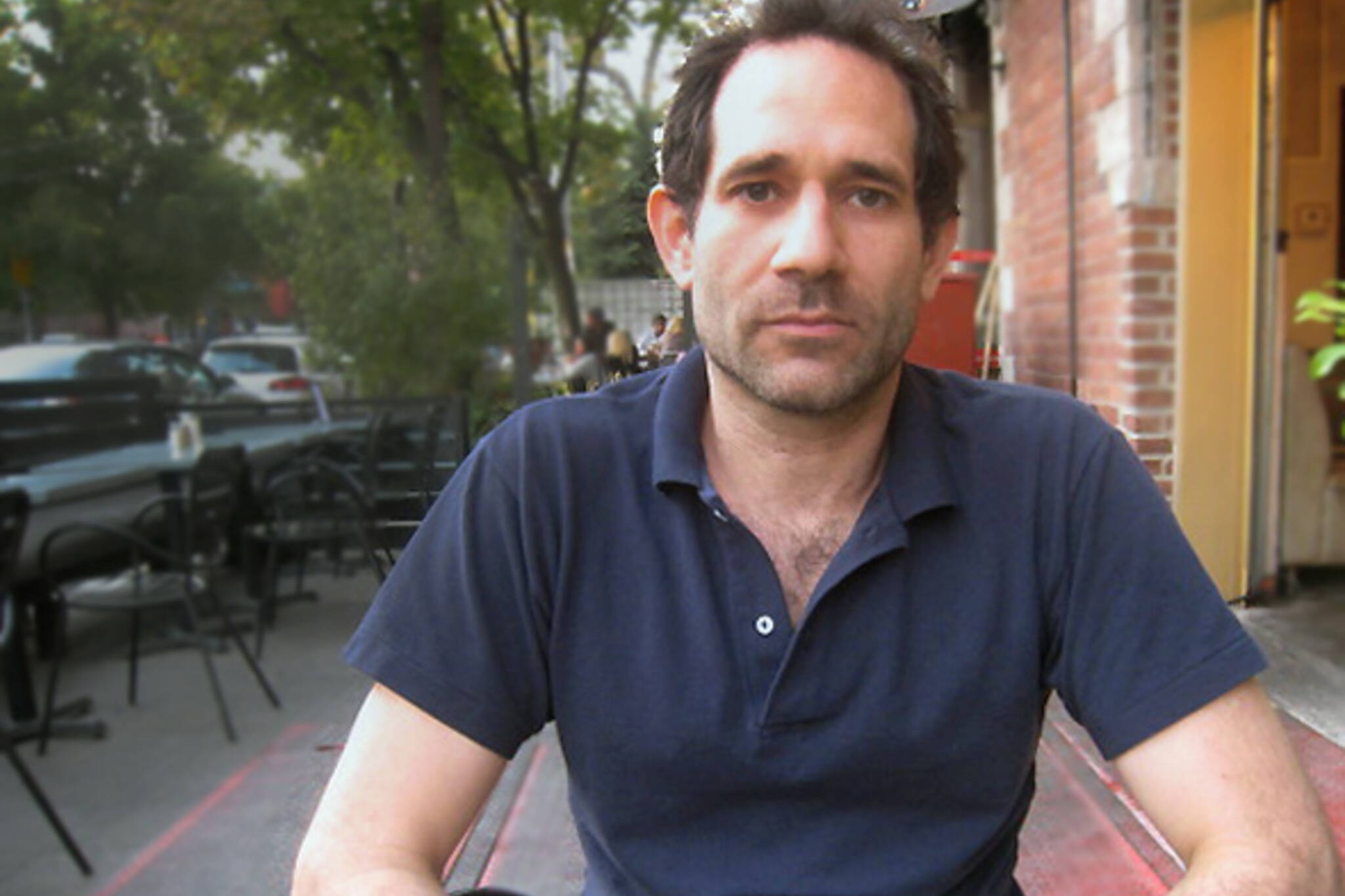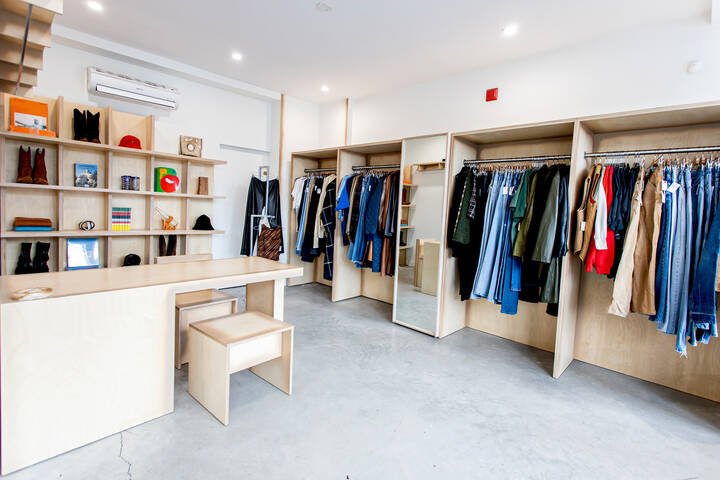
American Apparel's Dov Charney wants his comeback
Dov Charney is having a tank top crisis. "How many pieces did we sell in the last seven days? It's only one number and I need to know the total. Fine jersey tanks, did you say? We were selling 5,000 of these a week in year three and I don't know what else is going wrong."
The controversial 42-year-old CEO of American Apparel looks defeated for a moment, hangs up his BlackBerry and wolfs down a bite of bloody steak on the patio of the Drake Cafe.
"Shit, I got shit on myself."
Charney might have schmutz on his cream-coloured Oxford Welt Pocket Pants, but at least he's finally gotten something to eat. He's been holed up in the Direct Energy Building at the Canadian Exhibition Centre since 7 a.m., working at his company's first warehouse sale while a documentary camera crew follows him around. The day before he didn't get to eat until nine p.m. and ended up with a stress migraine.
He's tired, "falling apart" and admits to seizing up whenever he hears the sound of a cell phone vibrating. But the experiment seems to be working. After a string of sexual harassment charges from his employees, the loss of 1,500 immigrant workers and a loss of $86 million dollars last year, people are back to buying American Apparel.
This past weekend, premium-priced American Apparel could be had at a bargain. The Toronto warehouse sale was an attempt to match the prices of AA competitors like H&M and Forever 21. Branded as an urban company down to the cities listed on their shopping bags, there could never be an American Apparel outlet in the outskirts of Buffalo. So they're testing out their own version of the concept, filling up huge warehouses on the fringes of Toronto, Montreal and L.A.
Inside Toronto's airplane-hangar sized warehouse, shoppers rummage through piles of discounted "Interlock Turtleneck Tent Dresses" and "Baby Rib Dog Ts" (marked down from $14 to $3). The hazy guitar music of New Jersey band Real Estate pipes through the soundsystem, even though the aura of the store is off. When you walk through the rows of endless cotton t-shirts, you begin to notice how banal and plain American Apparel is. They are basics sold with sex, marketed to a generation who isn't supposed to care about branding.
At the warehouse Charney circles the floor on his cell phone, while a fleet of attractive female store merchandisers attempt to follow his whims, which at a moment's notice can change from "get everyone hamburgers" to "re-merchandise the entire floor." The women call him "eccentric," "spontaneous" and a "creative genius" and are a walking billboard for the company's sheer chiffon blouses and disco hot shorts.
The ropy, clean-shaven Charney is manic and fidgety, and loves to talk. In the hands that have caressed a thousand baby rib Brazilian bikini panties, he holds a talisman--a plastic P.O.P. clip that attaches to each sale display. Charney fiddles with this clip the way young girls play with their dolls.
Sitting at the next table on the Drake Patio are two of Charney's hires, both young comely babes with amorphous job descriptions.
"What are we going to price you at? We have to put a price on you so people know how much you are," chides his "kind of like operations" marketing manager Joey Ng.
"I'm thinking about it," replies Charney.
On the weekend of its eight-year anniversary, American Apparel is in recovery mode. Known as innovators for its anti-sweatshop practices, the company was caught hiring illegal immigrants and last year lost 20,000 workers. Charney, who works personally with every single employee from stock loaders to creative directors, had to interview 20,000 prospective workers to hire 6,000.
This put pressure on the creative energies of the brand, forcing AA to cut expenditures, including advertising. It used to be ubiquitous that a spread-eagled model in a cotton spandex jersey tank thong would grace the back page of NOW Magazine, VICE and The Village Voice. Today, American Apparel's ads are usually found in the middle of periodicals at a discount rate.
"This destabilized the entire capital structure," admits Charney. "That American Apparel wasn't well capitalized, meaning equity, is no big surprise. It's a young company by a 42-year-old."
Charney hopes that customers will recognize the company's growing pains and stay with the brand.
"The beauty of American Apparel is that it's not so contrived and sanitized and thought-through and made to work perfect," says its CEO.
"There is no doubt in people's minds about my authenticity," says Charney. "Otherwise I wouldn't be able to run this company. I wouldn't be able to walk the streets."
Charney might be the first post-baby boomer CEO, one that openly admits to sleeping with his employees and masturbated in 2004 in front of a reporter for Jane Magazine. Some have accused him of being unfit to run his own company. And indeed there are parallels to the legacy of Steve Jobs, an innovative thinker who was ousted by his own board of directors. On anyone else, Charney's past indiscretions would be intolerable. But he does work hard, and is motivated to turn things around, if only to save his company and himself.
Charney dries off his soiled pants, gathers his hottie merchandisers and prepares to go. But before he leaves, an advertisement for French Connection catches his eye. It's a perfect American Apparel facsimile down to the black and white Helvetica font and nipples visible underneath the model's see-through chiffon blouse.
"I am the blouse," the headline reads.
"'I am the blouse....' I like it," enthuses Charney. "There's a little bit of nip, I think."
I want to know if French Connection ripping off American Apparel makes Dov Charney pissed or proud.
"It is my set-up, but it doesn't piss me off," he says.
He gazes at the ad approvingly, and then at his young and lithe vintage buyer Trudy Hayden, wearing her own see-through chiffon blouse. It's magic hour on a sunny Saturday, and Charney thinks he'll hit half a million dollars this weekend.
"I had the back page of VICE, I had the back page of the Village Voice, I had the back page of Montreal Mirror," reminisces Charney. "So I'm coming out with jaws now, it's over. I'm gonna kill 'em. You know?"
Writing and photograph by Chandler Levack
Latest Videos
Latest Videos
Join the conversation Load comments







